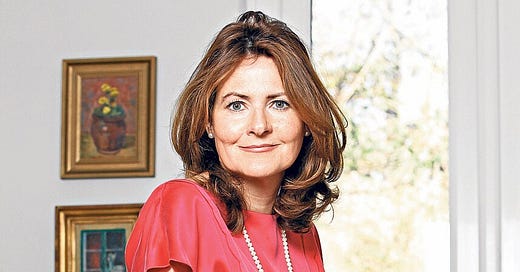Meet our judges: Cristina Odone
"No editor or journalist can fail to hear Orwell's voice echoing in their head."
Each year the Orwell Foundation awards prizes for the writing and reporting which best meet George Orwell’s ambition “to make political writing into an art”. Since the first annual Orwell Prizes were awarded in 1994, many distinguished figures from literature, journalism and public life have served on their judging panels: in this year alone, there are four independent panels across five prizes.
In this week’s interview, we spoke to Cristina Odone, a judge for the Orwell Prize for Political Writing 2023, about reading for the prize, her relationship with Orwell’s writing, why the Orwell Prize matters and more.
Cristina Odone is an Italian-British journalist, editor, and freelance writer. She is the founder of the Parenting Circle Charity and is a former Editor of the Catholic Herald and Deputy Editor of the New Statesman.
Since the establishment of the Orwell Prize for Political Fiction in 2019, the Orwell Prize for Political Writing has been awarded exclusively to a work of non-fiction. The finalists for this year’s prize will be announced in May 2023.
To many people judging a book prize will seem like a daunting task. How are you finding the reading?
From my earliest days, books have been part of what "home" means. That has been helpful in judging -- as I sit among hillocks if not mountains of books, eager to explore each one. For the book-shy, this would be a daunting, possibly an unwelcome task; for me, it's been a tremendous opportunity to venture into new territory. From Qatar to Grenfell, from a makeshift homeless shelter to the domestic economic quagmire, I am in new lands, and I am enjoying it tremendously.
What does good political writing mean to you? Why does the Orwell Prize's rewarding of it matter?
George Orwell courageously challenged the nostrums of his day; he was capable of extraordinary insights into the way humans behave and especially interact; and he was unflinchingly honest. His was not an ego trip, but a curious pilgrim's way through a dangerous era. The prestige of this prize -- everyone I know who has won it calls it life-changing -- bears testimony to the importance we still attach to Orwell's qualities.
Can you tell us something about your relationship with Orwell’s writing?
No editor or journalist can fail to hear Orwell's voice echoing in their head, whenever they write or rewrite a sentence. As deputy editor of the New Statesman (1998-2004) this was especially true: Orwell had written for the magazine and his influence was felt keenly, and often referred to. His most famous New Statesman piece, ‘For What am I Fighting?’ was a review of Arthur Koestler's Darkness at Noon, and remains one of the most eloquent denunciations of totalitarian regimes. More than half a century later we, the staff, felt immensely proud of our Orwellian legacy.
The conversation about the intersection of politics and religion has been heightened in recent weeks with comments by SNP leadership candidate Kate Forbes and Sandi Toksvig questioning the role of religion in the House of Lords. As a former editor of the Catholic Herald, what are your thoughts on the way political policy and religious views overlap?
My childhood in Italy, where Catholicism suffused the air we breathed, did not prepare me for the way Britons would view my faith. We were "outlandish" and our views contentious. And yes, Catholicism is a subversive force in its vision of social justice, and in its pro-family, and selfless ethos. This runs counter to twenty-first century values. We don't live in a theocracy nor should we; but having among us individuals who challenge the materialistic and hedonistic status quo is a welcome addition to public life.





I wish we had an Orwell Prize in the U.S. The recent congressional Hearings where two independent journalists, Matt Taibbi and Michael Shellenberger, were vilified by the Democratic Party for exposing the extent of social media censorship about COVID via the Standford University Virology Project was terrifying. In the U.S. the "left" has become the "right" and the journalists and publishing houses in legacy media remind me of the difficulty Orwell had in getting a publisher for Animal Farm.